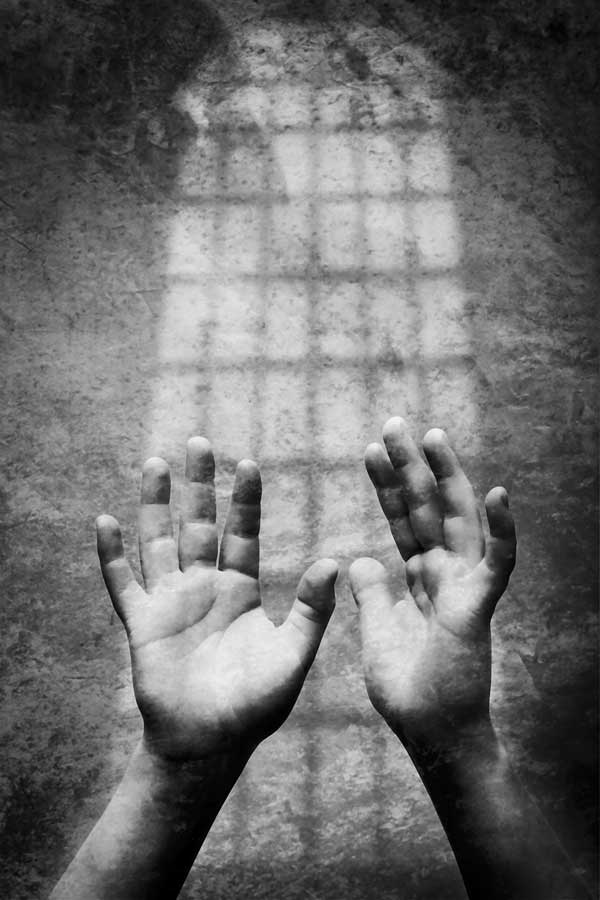All
A Devotional on Seeking God
 It is intrinsic to our conception of God that God is inherently invisible. “You cannot see my face,” God famously told Moses on the mountain, “for man shall not see me and live” (Exod 33:20, esv). God in himself cannot be seen directly. If he is to be seen at all, it must be through some sort of manifestation in another form, some kind of epiphany.
It is intrinsic to our conception of God that God is inherently invisible. “You cannot see my face,” God famously told Moses on the mountain, “for man shall not see me and live” (Exod 33:20, esv). God in himself cannot be seen directly. If he is to be seen at all, it must be through some sort of manifestation in another form, some kind of epiphany.A Prayer and Fasting Devotional
 “See what great love the Father has lavished on us, that we should be called children of God! And that is what we are!” - 1 John 3:1a
“See what great love the Father has lavished on us, that we should be called children of God! And that is what we are!” - 1 John 3:1aDo you look like your parents or siblings? Those of us who do have inevitably experienced a moment when someone meets our family, or sees their picture, and exclaims that (goodness gracious!) you look just like them! Familial resemblance does not just involve our good looks; in even deeper ways we can see it in our behavior. This can go from the mundane (we laugh like our grandfather) to the good (we are compassionate like our mother) to the bad (we have a temper like our older brother). Our families resemble each other in deep and meaningful ways, and this comes into especially sharp focus when we get married. Marriage brings together two people from different families who immediately notice that they have developed different (and sometimes wonderfully complementary!) practices because, "that's how my family does it."
A Parable on Prayer
 We won’t always see our prayers answered. If there is no guarantee for answered prayer, why should we persist in prayer?
We won’t always see our prayers answered. If there is no guarantee for answered prayer, why should we persist in prayer?In Luke 18:1-8, Jesus addressed this issue head-on:
And he told them a parable to the effect that they ought always to pray and not lose heart. He said, “In a certain city there was a judge who neither feared God nor respected man. And there was a widow in that city who kept coming to him and saying, ‘Give me justice against my adversary.’ For a while he refused, but afterward he said to himself, ‘Though I neither fear God nor respect man, yet because this widow keeps bothering me, I will give her justice, so that she will not beat me down by her continual coming.’” And the Lord said, “Hear what the unrighteous judge says. And will not God give justice to his elect, who cry to him day and night? Will he delay long over them? I tell you, he will give justice to them speedily. Nevertheless, when the Son of Man comes, will he find faith on earth?
A Prayer and Fasting Devotional
 When a monk asks you a question, it’s generally wise to listen. I learned this lesson on an annual silent retreat at a monastery of the Society of Saint John the Evangelist in Cambridge, Massachusetts. During his sermon, a brother was describing the various perspectives on the “real presence” of Christ in the eucharist, but, rather than tease out the fineries of the real presence of Christ in the elements, he suggested that, even better than inquiring into the presence of Christ, we might ask instead, “am I really present?”
When a monk asks you a question, it’s generally wise to listen. I learned this lesson on an annual silent retreat at a monastery of the Society of Saint John the Evangelist in Cambridge, Massachusetts. During his sermon, a brother was describing the various perspectives on the “real presence” of Christ in the eucharist, but, rather than tease out the fineries of the real presence of Christ in the elements, he suggested that, even better than inquiring into the presence of Christ, we might ask instead, “am I really present?” Without doubt, our nation’s dilemma is principally spiritual in nature. Our culture is decaying because too many of us are living without God in our lives. The church must take this seriously and do all it can to call men, women and children to faith in God through Jesus Christ. The surest way to cultural change is for people to be transformed spiritually by God. The work of evangelism and disciple-making is, and will always be, the church’s most important work.
Without doubt, our nation’s dilemma is principally spiritual in nature. Our culture is decaying because too many of us are living without God in our lives. The church must take this seriously and do all it can to call men, women and children to faith in God through Jesus Christ. The surest way to cultural change is for people to be transformed spiritually by God. The work of evangelism and disciple-making is, and will always be, the church’s most important work.A Prayer and Fasting Devotional
 For those of us who love the grace of the Gospel, who are convinced that God accomplishes through Christ everything we need for salvation, the idea that we must perform religious works, such as prayer or fasting, in order to receive grace and spiritual blessings from God doesn’t sit well. Here’s an illustration of what I’m talking about.
For those of us who love the grace of the Gospel, who are convinced that God accomplishes through Christ everything we need for salvation, the idea that we must perform religious works, such as prayer or fasting, in order to receive grace and spiritual blessings from God doesn’t sit well. Here’s an illustration of what I’m talking about. A Prayer and Fasting Devotional
 “…and they were singing a new song before the throne and before the four living creatures and before the elders. No one could learn that song except the 144,000 who had been redeemed from the earth.” – Revelation 14.3
“…and they were singing a new song before the throne and before the four living creatures and before the elders. No one could learn that song except the 144,000 who had been redeemed from the earth.” – Revelation 14.3 Narrative tension makes a story. Imagine that Cinderella and the prince had met in childhood, immediately delighted in one another, enjoyed the full support of their family and friends, married quickly, with no wedding snafus of any kind and little need for pre-marital counseling, and lived happily ever after. While that might be an attractive narrative for the couple, it makes for pretty uninteresting reading. We, the reader, know that a good story must include a significant amount of conflict to make for a satisfactory resolution.
A Prayer and Fasting Devotional

O Lord, who shall sojourn in your tent?
Who shall dwell on your holy hill?
He who walks blamelessly and does what is right
and speaks truth in his heart;
-Psalm 15: 1, 2
A Prayer and Fasting Devotional
 The crowd joined in attacking them, and the magistrates tore the garments off them and gave orders to beat them with rods. And when they had inflicted many blows upon them, they threw them into prison, ordering the jailer to keep them safely. Having received this order, he put them into the inner prison and fastened their feet in the stocks.
The crowd joined in attacking them, and the magistrates tore the garments off them and gave orders to beat them with rods. And when they had inflicted many blows upon them, they threw them into prison, ordering the jailer to keep them safely. Having received this order, he put them into the inner prison and fastened their feet in the stocks.About midnight Paul and Silas were praying and singing hymns to God, and the prisoners were listening to them, and suddenly there was a great earthquake, so that the foundations of the prison were shaken. And immediately all the doors were opened, and everyone's bonds were unfastened. - Acts 16:22-26
Since then we have a great high priest who has passed through the heavens, Jesus, the Son of God, let us hold fast our confession. For we do not have a high priest who is unable to sympathize with our weaknesses, but one who in every respect has been tempted as we are, yet without sin. Let us then with confidence draw near to the throne of grace, that we may receive mercy and find grace to help in time of need. — Hebrews 4:14-16
Overcoming Pride and Anxiety
By Chris Matthews
From Yale Faith & Action

What motivates you everyday to do the things you do? Two common motivators for us tend to be pride and anxiety. In this lecture, we look at what God says should motivate us in all things and how to overcome pride and anxiety as our primary motivators...
Listen Now >
Subscribe Today





